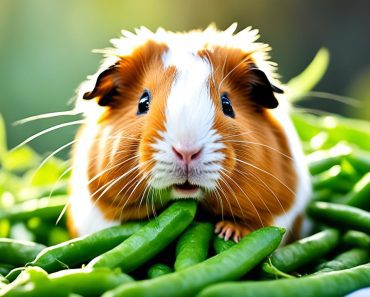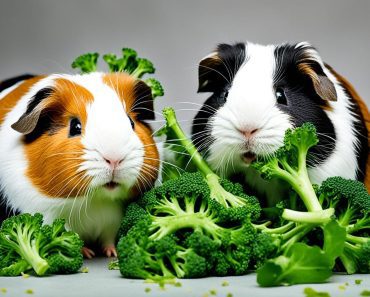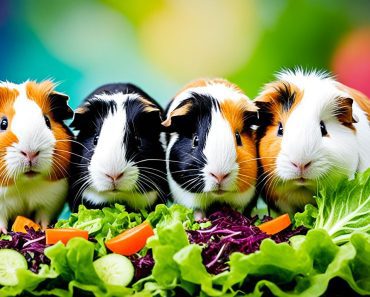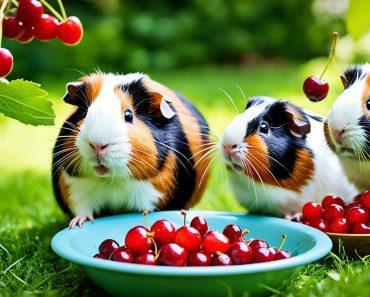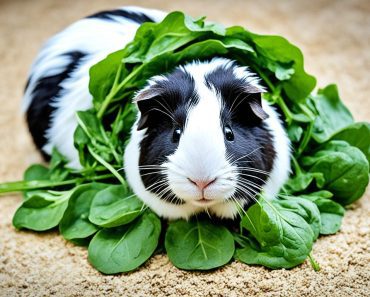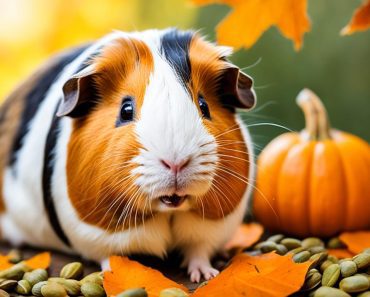Hello, fellow guinea pig lovers! Today, I want to address a common question that many of us have pondered: Can guinea pigs eat peanuts? As an avid guinea pig owner myself, I understand the importance of providing a healthy and balanced diet for these adorable creatures. Let’s dive into the topic and uncover the truth about peanuts and guinea pigs.
Can Guinea Pigs Eat Peanuts? Yes, but it is not advisable and better avoided.
- Peanuts are not suitable for guinea pigs: Due to their high fat content, peanuts should not be included in a guinea pig’s diet.
- Health risks associated with peanuts: Peanuts can cause gastrointestinal issues, choking hazards, obesity, and urinary stones in guinea pigs.
- A balanced diet is crucial: Guinea pigs require a diet consisting of high-quality hay, fresh greens and vegetables, limited pellets, and limited fruit.
- Avoid feeding guinea pigs nuts: Peanuts and other nuts are not part of a guinea pig’s natural diet and offer no health benefits.
- Consult a veterinarian: Always seek professional advice from a vet to ensure your guinea pig’s dietary needs are met.
Now that we’ve covered the basics, let’s explore why it’s best to avoid feeding peanuts to our furry friends.
Why Guinea Pigs Shouldn’t Be Fed Nuts
Guinea pigs, as herbivores, have a digestive system that is not designed to process foods rich in fat, protein, and carbohydrates like nuts. While nuts are not toxic to guinea pigs, they provide no health benefits and can lead to potential health problems and complications.
When it comes to the health effects of peanuts on guinea pigs, it is best to avoid feeding them nuts altogether. Instead, focus on providing a diet that consists of grasses, diverse vegetation, and nutritionally balanced food under the supervision of a veterinarian.
Feeding guinea pigs nuts can cause digestive issues and discomfort due to their high fat content. Additionally, the protein and carbohydrate content in nuts exceeds the nutritional needs of guinea pigs, which can lead to obesity and other related health concerns.
Guinea pigs thrive on a diet that is primarily plant-based and high in fiber. Their digestive systems are adapted to process fibrous materials such as hay and grass. By providing a diet rich in these essential components, guinea pigs can maintain optimal digestive health and overall well-being.
While nuts may be a popular and nutritious snack for humans, they are not suitable for guinea pigs. It is crucial to prioritize their specific dietary needs and avoid introducing foods that can potentially harm their health.
“As a veterinarian, I strongly advise against feeding peanuts or any other nuts to guinea pigs. These animals require a balanced and fiber-rich diet to ensure optimal digestive health and prevent complications. Nuts can disrupt their delicate stomachs and cause unnecessary health issues.”
If you are unsure about what to feed your guinea pig, consult your veterinarian for guidance. They can provide valuable advice tailored to your pet’s specific nutritional requirements.
| Food Item | Can Guinea Pigs Eat? |
|---|---|
| Peanuts | No |
| Hay | Yes |
| Grasses | Yes |
| Variety of Vegetation | Yes |
| Nutritionally Balanced Food | Yes |
Potential Complications of Feeding Nuts to Guinea Pigs
Feeding nuts to guinea pigs can have several potential complications and adverse effects on their health. Due to their high fat and carbohydrate content, nuts can lead to gastrointestinal problems, such as abdominal pain and diarrhea in guinea pigs. The digestive system of guinea pigs is not designed to process foods rich in fat and carbohydrates like nuts, making them difficult to digest properly.
Nuts also pose a choking hazard to guinea pigs, who lack a gag reflex and cannot vomit. Their small size and hard texture make them a potential choking hazard, especially for guinea pigs who have a habit of eating quickly without chewing their food thoroughly. This can lead to choking and respiratory distress in guinea pigs, posing a serious threat to their well-being.
Additionally, nuts can contribute to obesity in guinea pigs. They are naturally high in fats and may contain sugars, which can lead to weight gain and obesity if consumed in excess. Obesity is a significant health concern for guinea pigs and can lead to various health issues, including cardiovascular problems, joint pain, and a decreased lifespan.
Furthermore, the high calcium content in nuts, especially almonds, can increase the risk of urinary stones in guinea pigs. Urinary stones can cause blockages in the urinary tract, leading to pain, discomfort, and potential organ damage. This condition requires immediate veterinary attention and can result in serious health complications for guinea pigs if left untreated.
“Feeding nuts to guinea pigs can lead to gastrointestinal problems, choking hazards, obesity, and urinary stones.”
It is essential to prioritize the health and well-being of guinea pigs by providing them with a well-balanced diet that meets their nutritional needs. Feeding them a diet primarily consisting of hay, fresh greens and vegetables, limited amounts of commercial pellets, and minimal fruit is crucial for their overall health. Avoid feeding guinea pigs nuts or any other foods that are not part of their natural diet to ensure their well-being and prevent potential complications.
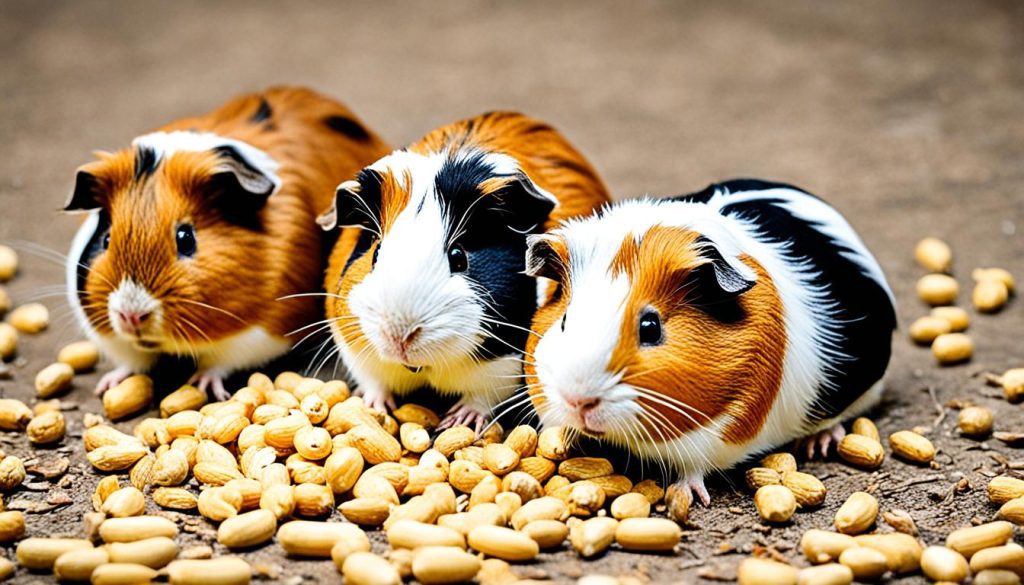
| Complications of Feeding Nuts to Guinea Pigs | Prevention |
|---|---|
| Gastrointestinal problems | Avoid feeding nuts to guinea pigs |
| Choking hazards | Do not give guinea pigs nuts |
| Obesity | Provide a well-balanced diet and limit fatty foods |
| Urinary stones | Avoid nuts high in calcium content |
Typical Guinea Pig Diet
A guinea pig’s diet is crucial for their overall health and well-being. As herbivores, their diet primarily consists of high-quality hay, fresh greens and vegetables, limited amounts of commercial pellets, and small amounts of fruit. Let’s take a closer look at these key components:
Hay
Hay is the foundation of a guinea pig’s diet. It provides essential fiber, promotes healthy digestion, and helps wear down their continuously growing teeth. Timothy hay is the most commonly recommended type of hay for guinea pigs, but other options like orchard grass, meadow grass, or oat hay can also be included. It is essential to provide unlimited access to fresh, clean hay at all times.
Fresh Greens and Vegetables
Fresh greens and vegetables are essential sources of vitamins and minerals for guinea pigs. They should be given daily and make up around 10-20% of their overall diet. Some suitable options include romaine lettuce, bell peppers, carrots, cucumber, kale, spinach (in moderation), and herbs like cilantro and parsley. It is important to introduce new greens slowly to prevent digestive upset.
Commercial Pellets
Commercial pellets fortified with vitamin C are a crucial part of a guinea pig’s diet. Look for high-quality, guinea pig-specific pellets that are fresh and free from added sugars. Pellets should make up around 5-10% of their diet and can be offered in limited amounts to ensure they get the necessary nutrients without overeating.
Fruit
Fruit should be given as a treat in small amounts. It can provide additional vitamins and natural sugars. Suitable options include apples, strawberries, blueberries, and melons. However, due to their high sugar content, fruits should be given sparingly, about 1-2 times per week.
It is important to provide a well-balanced, varied diet that meets the nutritional needs of guinea pigs. Always consult with a veterinarian for guidance on your guinea pig’s diet and avoid adding any new foods without professional advice.
Recommended Fruits and Vegetables for Guinea Pigs
When it comes to feeding guinea pigs, incorporating a variety of fruits and vegetables into their diet is essential for their overall health and well-being. Here are some recommended options:
| Fruits | Vegetables |
|---|---|
| Bell peppers | Romaine lettuce |
| Carrots | Broccoli |
| Cucumber | Spinach (in moderation) |
| Squash | Artichokes |
| Tomatoes | Kale |
| Brussels sprouts | Collard greens |
| Various herbs like cilantro, dill, and parsley |
It is important to introduce new fruits and vegetables slowly, one at a time, to ensure they are well tolerated by your guinea pig’s digestive system. Additionally, it is crucial to be mindful of foods high in calcium and natural sugars, as excessive consumption can lead to health issues. Always consult with a veterinarian to ensure the fruits and vegetables you offer are appropriate and safe for your guinea pig’s diet.
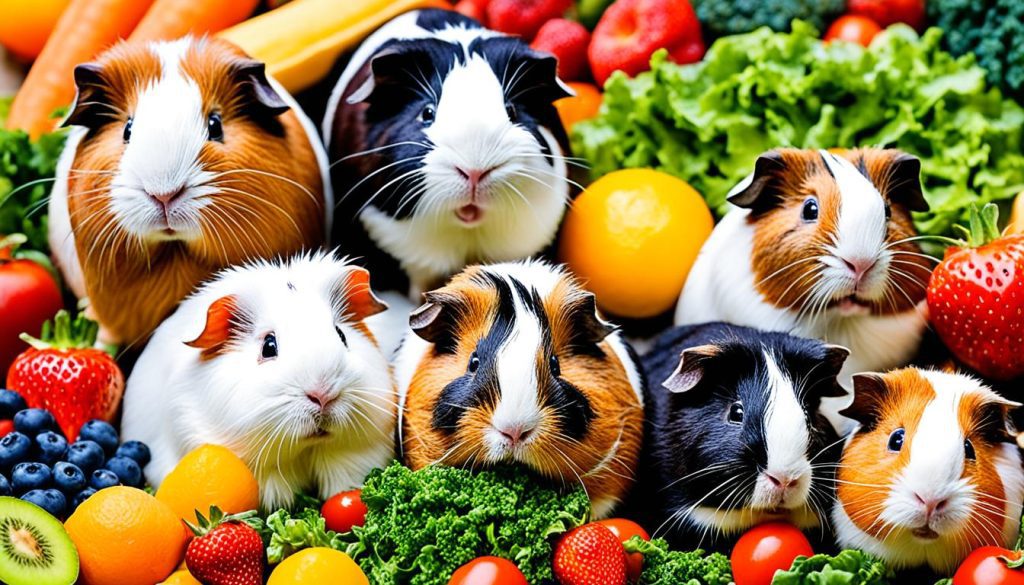
Foods to Avoid
When it comes to feeding guinea pigs, there are certain foods that should be avoided. These foods can be harmful to their health and may cause various issues such as toxicity, choking hazards, gastrointestinal upset, and high sugar or fat content that is not suitable for guinea pigs. To ensure the well-being of your furry friends, it’s essential to be aware of these foods and steer clear of them.
Toxic Foods
- Chocolate
- Onions
- Garlic
- Mushrooms
- Avocados
- Rhubarb
- Houseplants
Foods with Choking Hazards
- Nuts
- Seeds
- Peanut Butter
- Bread
Foods that Cause Gastrointestinal Upset
- Iceberg Lettuce
- Potatoes
- Dairy Products
- Lawnmower Grass Cuttings
Feeding guinea pigs a well-balanced and appropriate diet is crucial for their overall health and happiness. Avoiding these foods will help ensure that your guinea pigs receive the nutrition they need without the risk of harmful effects.
Remember, guinea pigs have specific dietary requirements, and it’s best to stick to foods that are part of their natural diet. If you have any doubts or questions about what to feed your guinea pigs, consult with a veterinarian who can provide expert guidance tailored to your pet’s needs.
Conclusion
After careful consideration, it is clear that feeding peanuts to guinea pigs is not safe and should be avoided. While peanuts are not toxic to guinea pigs, their high fat content can lead to various health issues. Guinea pigs are herbivores, and their digestive system is not designed to process foods rich in fat, protein, and carbohydrates like nuts.
To ensure the well-being of your furry friend, it is essential to provide them with a well-balanced diet that meets their nutritional needs. This diet should consist of high-quality hay, fresh greens and vegetables, limited amounts of commercial pellets, and small amounts of fruit. It is crucial to consult with a veterinarian for guidance on your guinea pig’s diet and avoid feeding them foods that are not part of their natural diet.
Remember that guinea pigs rely on us to make the best choices when it comes to their nutrition. By feeding them a proper diet and avoiding potentially harmful foods like peanuts, you can help them stay healthy and happy for years to come.

